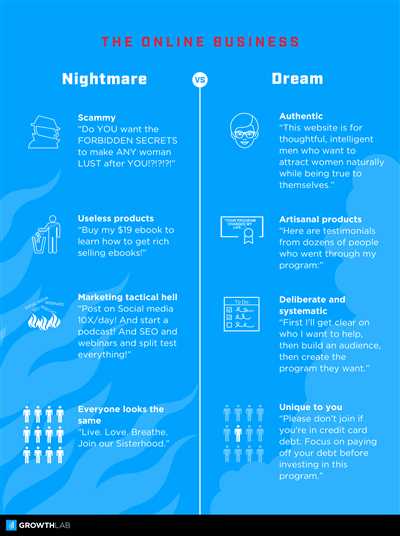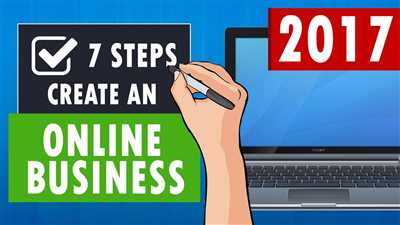
Creating an online business has never been easier. With the rise of technology and the internet, entrepreneurs now have direct access to a global market. However, before diving into the world of e-commerce, it’s essential to consider the structures, steps, and possible challenges of starting an online business.
First and foremost, you need to identify a niche or product/service that sells. It might be a little challenging to find a perfect product or service, but there are several ways to validate if your idea is profitable. You can start by creating a blog or using software to build a website to showcase your product. Once you have a prototype, you can get feedback from potential customers through surveys or video demonstrations.
Next, you need to decide on a business model. There are several options to choose from, such as dropshipping, selling through Amazon, or creating your own online store. Each model has its advantages and disadvantages, so it’s crucial to weigh them against your specific goals and resources. For example, dropshipping might be a feasible option if you don’t want to deal with inventory management, while selling through Amazon gives you access to a broad customer base.
Once you’ve determined the most suitable business model, it’s time to handle the legal aspects. Depending on your country or region, there might be regulations and specific requirements you need to comply with. It’s always a good idea to consult with a lawyer who specializes in online business to ensure that you are on the right side of the law and protect yourself from any liability.
With the legalities taken care of, you can now focus on building your online presence. This involves creating a website, establishing social media channels, and implementing effective marketing strategies. Many entrepreneurs often hire freelance help or use sites such as Upwork to delegate tasks they’re not necessarily skilled in, allowing them to focus on their core business.
Having an online business gives you much more flexibility compared to traditional brick-and-mortar stores. You can work from anywhere in the world and reach customers beyond your local market. However, it’s important to remember that success doesn’t come overnight. It requires dedication, hard work, and continuous learning. So, start small, be patient, and never be afraid to seek advice from experienced entrepreneurs who have been through similar journeys.
In conclusion, starting an online business is a feasible and potentially profitable venture. By following the right steps and considering the specific needs of your target market, you can build a successful online business that generates income and allows you to live life on your own terms.
- How to Start an Online Business in 2023
- Different types of online businesses
- Affiliate Marketing
- Focus On Content Marketing
- Creating A Blog
- Having A Social Media Presence
- Using Email Marketing
- 8 Steps to Starting an Online Business
- 1 – Come up with a business Idea
- 2 – Validate Your Idea
- Identify your target audience
- Conduct market research
- Test your idea
- Get feedback
- Validate your pricing model
- Consider competition
- Start small and scale up
- Handle legal and financial aspects
- 3 – Create a Business Plan
- 4 – Research regulations get legal advice
- 5 – Choose a business structure
- 6 – Develop your product/service
- Video:
- how to start a SUCCESSFUL small business in 2024 🌷📦 the ULTIMATE guide, advice, everything i learned
How to Start an Online Business in 2023
Starting an online business has become increasingly popular since the start of the COVID-19 pandemic. With more people working remotely and shopping online, it has become a necessity for many entrepreneurs to shift their focus to the online market. However, starting an online business is not necessarily an easy task. It requires careful planning, research, and a solid strategy to be successful.
One possible first step is to create a business plan. This will help you outline your idea, determine the feasibility of your business, and understand your target market. It will also allow you to assess the costs involved, both in terms of setting up your online platform and acquiring customers.
When it comes to choosing your product or service, it’s important to do thorough research. Make sure there is a market for your offering and gather as much information as possible about your potential customers. This will help you tailor your product or service to meet their needs and stand out from the competition.
Building a team may also be part of your start-up journey. While some entrepreneurs may be able to manage everything on their own, others may need to hire experts in certain areas, such as web design, marketing, or customer service. Having an excellent team in place can make a big difference in the success of your online business.
An online presence is key for any online business. Creating a blog, for example, can have many advantages. It allows you to provide valuable content to your audience, establish yourself as an expert in your niche, and attract potential customers. You can also use your blog to collect emails and build a loyal customer base.
Another option is to leverage existing online platforms, such as Amazon or Etsy, to sell your products. These platforms already have a large audience and can provide access to potential customers without the need for extensive marketing efforts. However, keep in mind that these platforms may charge fees for their services.
Marketing is a crucial part of any online business. You’ll need to develop a marketing plan and identify the best channels for reaching your target audience. This may include social media, paid advertising, content marketing, or email marketing, among others. Each channel has its own advantages and you’ll need to determine which ones will work best for your business.
It’s also important to consider the legal and financial aspects of starting an online business. Depending on the type of business you’re starting, you may need to register as a sole proprietor or form a limited liability company. It’s a good idea to consult with a lawyer or accountant to ensure you’re complying with all necessary regulations.
Overall, starting an online business in 2023 can be a profitable endeavor. With the right planning, research, and strategy, you can create a successful online business that caters to the needs of your target audience. So, if you’re willing to put in the work and stay focused, the world of online business is open for you to explore.
Different types of online businesses
When it comes to starting an online business, there are many different types of ventures you can explore. Each type offers its own unique benefits and challenges, so it’s important to choose the one that best fits your skills, interests, and goals.
One popular type of online business is e-commerce, which involves selling products over the internet. This can be done by creating your own online store or using platforms like Amazon or eBay to sell your goods. E-commerce businesses can offer a wide range of products, from physical items like clothing or electronics to digital goods like e-books or software.
 | Another type of online business is dropshipping. With this model, you don’t need to hold any inventory. Instead, you partner with a supplier who handles the storage, packaging, and shipping of the products. When a customer places an order, the supplier ships the product directly to them. This can be a great option for those who want to start an online business with little upfront cost. |
Affiliate marketing is another popular way to make money online. With this strategy, you promote other people’s products and earn a commission for every sale that is made through your unique affiliate link. This can be a great way to earn passive income, as you don’t need to create your own product or handle customer service.
If you enjoy creating content, you might consider starting a blog or YouTube channel. These platforms allow you to share your thoughts, expertise, and ideas with a wide audience. While it may take time to build a loyal following, the potential to monetize your content through ads, sponsorships, and product recommendations is very possible.
For those who are skilled in writing, freelancing is a great option. Many businesses and individuals are willing to hire freelance writers for content creation, copywriting, and more. This type of online business allows you to work flexible hours and be your own boss.
Social media management and digital marketing are also growing fields in the online business world. As more companies realize the importance of having a strong online presence, they often seek professionals who can help them navigate the various social media channels and create effective marketing campaigns. If you have experience in this area, it can be a lucrative business to consider.
Overall, there are many different types of online businesses to choose from. It’s important to thoroughly research each option and consider factors like your skills, interests, and the market demand. By taking the time to create a solid business plan and focus on building a strong online presence, you can get started on your online business journey and potentially achieve great success by 2023.
Affiliate Marketing
Affiliate marketing is a popular way to earn money online. In this model, you partner with companies and promote their products or services on your website, blog, or social media channels. When customers click on your affiliate links and make a purchase, you earn a commission.
One of the main advantages of affiliate marketing is that you don’t need to build your own product or service. You can simply focus on promoting and recommending products that have already been developed by others. This saves you time, money, and effort compared to starting a business from scratch.
To start an affiliate marketing business, you first need to choose a niche or topic for your blog or website. Many successful affiliate marketers have built their businesses by focusing on a specific area of interest, such as fashion, technology, or home improvement.
Next, you need to create high-quality content that will attract and engage your audience. This can be in the form of blog posts, videos, podcasts, or social media updates. The more valuable and informative your content is, the more likely it is that people will come to your site and click on your affiliate links.
Once you have a steady stream of traffic to your site, you can start monetizing your blog by incorporating affiliate links into your content. Make sure to disclose your affiliate partnerships and be transparent with your readers about any potential conflicts of interest.
When choosing affiliate partners, look for companies with good reputations, high-quality products or services, and attractive commission rates. It’s also important to consider the level of support and resources they provide to their affiliates.
As you start earning commissions, it’s important to track your earnings and keep an eye on your expenses. Make sure to set aside some of your profits for taxes and other business-related expenses.
Affiliate marketing can be a profitable and flexible way to earn money online. However, it’s not a get-rich-quick scheme, and success will depend on your ability to attract customers and convert them into buyers. Make a plan, develop a strategy, and dedicate time and effort to growing your affiliate marketing business.
In conclusion, affiliate marketing is a feasible way to earn money online without having to build your own product or service. By partnering with companies and promoting their products or services, you can earn commissions on every sale made through your unique affiliate links. With careful planning and dedication, you can create a profitable affiliate marketing business.
Focus On Content Marketing
Content marketing has been a crucial part of online business success. It requires an investment of time and effort, but it can lead to significant returns. Many entrepreneurs are willing to put in the work to create the perfect content strategy that might help them scale their business.
At the core of content marketing is creating valuable and relevant content for your target audience. This could be in the form of blog posts, ebooks, videos, or social media posts. By using content to become an authority in your niche, you can attract and engage potential customers, build trust, and establish your brand’s presence online.
One important step-by-step approach to content marketing is validating your market and understanding your buyers. By doing market research and identifying your target audience’s needs and pain points, you can create content that speaks directly to them. This will help you attract the right customers and generate sales.
When it comes to content marketing, it’s important to choose the right platform to showcase your content. Many entrepreneurs start with a small website or blog and then expand to other platforms like social media or a marketplace. For example, if you’re starting an e-commerce store, you might choose to create content using Instagram to better reach your customers.
While creating content yourself can be a great approach, there’s still a need for hiring professionals or partnering with content creators to achieve better results. Many entrepreneurs choose to hire writers, designers, or video producers to create high-quality content that resonates with their audience.
Another advantage of content marketing is that it works hand in hand with other marketing strategies. For example, you can use content to drive traffic to your website and then use email marketing to nurture those leads. This integrated approach can help you maximize your results and reach more potential customers.
As with any online business strategy, it’s important to plan and set goals for your content marketing efforts. Create a content marketing plan that outlines your objectives, target audience, desired outcomes, and the resources needed to achieve them. This plan will serve as a roadmap for your content creation and distribution activities.
Lastly, it’s important to protect yourself legally when it comes to content marketing. Ensure that you have the necessary disclaimers, privacy policies, and copyrights in place. If you’re unsure about legal structures, it’s always a good idea to consult with a lawyer who specializes in online business to ensure you’re compliant with the law.
In summary, content marketing is a powerful strategy for online businesses. By creating valuable and relevant content, you can attract and engage your target audience, build trust and establish your brand’s presence. With proper planning and execution, content marketing can help you achieve your business goals and drive success.
Creating A Blog
Starting an online business can be a profitable and feasible venture, and one way to do this is by creating a blog. Blogs have become a popular option for entrepreneurs who want to offer a service or share their expertise in a particular field. Creating a blog allows individuals to have access to a wide audience and monetize their content in various ways.
One of the advantages of starting a blog is that it can be done as a sole proprietorship, which means you have full control over the content and can make all the decisions regarding its operation. There are minimal regulations to abide by, making it a flexible option for individuals planning to start an online business.
To create a successful blog, there are several steps you should consider:
- Research your target audience: Before getting started, it’s essential to identify who your potential customers or readers are. This will help you tailor your content to their interests and needs.
- Create a content strategy: Focus on what type of content you will be providing and how often you will be posting. Consistency is key to attracting and retaining readers.
- Choose a blogging platform: There are plenty of options available, from popular blogging platforms like WordPress to content management systems like Joomla or Drupal.
- Create a brand statement: Determine what your blog is all about and craft a clear and concise brand statement that reflects your mission and purpose.
- Produce high-quality content: Your blog’s success will depend on the quality of your content. Take the time to write well-researched and engaging posts that provide value to your readers.
- Market your blog: Use social media, email marketing, and other strategies to promote your blog and attract readers. Consider partnering with other bloggers or websites to increase your reach.
Once you have taken these steps and started your blog, you can explore various monetization options such as affiliate marketing, selling digital products or software, or offering sponsored posts or reviews. Many successful bloggers also partner with brands and companies to create sponsored content.
Remember that starting a blog is a journey, and success doesn’t happen overnight. It requires dedication, continuous learning, and adaptability. However, with the right research, planning, and strategy, anyone willing to put in the time and effort can create a profitable online business through blogging.
Just keep in mind that while blogging offers many advantages, such as the ability to work from anywhere and have unlimited earning potential, it’s important to stay legal and protect your content. Familiarize yourself with copyright and intellectual property laws, and consider investing in legal protection.
So, if you’re an aspiring entrepreneur looking to start an online business, creating a blog could be the perfect option to share your passion and expertise with the world.
Having A Social Media Presence
When it comes to starting an online business, having a social media presence is essential. Social media platforms provide a valuable opportunity to reach a wide audience and promote your products or services. Here are some ways to effectively use social media to grow your online business:
1. Research your target audience: Before you start using social media for your business, it’s important to understand who your target audience is. This will help you tailor your content and marketing efforts to better resonate with them. Conduct surveys, analyze data, and listen to feedback to gain insights into your audience’s preferences and behaviors.
2. Develop a content strategy: Plan out what type of content you want to create and how often you will post. This could include blog articles, videos, or even live streams. Make sure your content provides value to your audience and aligns with your brand message.
3. Build a community: Social media platforms allow you to build a community around your brand. Engage with your audience by responding to comments, asking for feedback, and starting conversations. Building relationships with your followers will create a loyal customer base.
4. Utilize different social media platforms: Consider using multiple social media platforms to reach a wider audience. Each platform has its own unique features and user demographics, so do some research to find the ones that best align with your target audience.
5. Collaborate with influencers or partners: Partnering with influencers or other businesses in your industry can help expand your reach. They can promote your products or services to their audience, giving you access to a new group of potential customers.
6. Use affiliate marketing: Consider setting up an affiliate program, where others can earn a commission by promoting your products or services. This can be a great way to increase sales and reach wider audiences.
7. Protect yourself legally: When using social media for your business, it’s important to be aware of the legal implications. Consult with a lawyer to ensure you are following all necessary laws and regulations, especially when it comes to data protection and advertising standards.
8. Track and analyze your social media efforts: Use analytics tools to track the performance of your social media posts. This will help you understand what content is resonating with your audience and adjust your strategy accordingly.
Having a social media presence can be a game-changer for your online business. It allows you to promote your products or services to a wider audience and build a loyal customer base. Consider implementing these strategies to make the most out of your social media presence.
Using Email Marketing
Email marketing is a valuable tool for online businesses to connect with their target market, build customer relationships, and drive sales. By conducting research and focusing on the right steps, you can effectively use email marketing to promote your products or services and grow your business.
One of the key steps in using email marketing is to identify your target market. Understanding your audience will help you create relevant and compelling email content that resonates with your subscribers. You should also have a clear goal for your email marketing campaigns, whether it’s to drive sales, increase website traffic, or build brand awareness.
To get started with email marketing, you will need to build a subscriber list. This can be done by offering valuable content on your website or through partnerships with other businesses. To keep your subscribers engaged, it’s important to send regular email newsletters or updates. Depending on your business model, you may also offer exclusive discounts or promotions to your email subscribers.
When creating email content, focus on personalization and segmentation. Tailor your messages to different customer segments based on their preferences, purchase history, or demographic information. This will increase the likelihood of engagement and conversions.
It’s important to note that you should only email your subscribers when they’ve given you explicit permission to do so. This is to comply with anti-spam laws and to maintain a positive reputation as a sender. Always provide a clear option for recipients to opt-out of your emails.
In terms of email frequency, the key is to find a balance. You don’t want to inundate your subscribers with emails, but you also don’t want to go long periods without connecting with them. It’s important to test different frequencies and analyze your email performance metrics to find the optimal sending cadence for your audience.
When it comes to email design, keep it simple and mobile-friendly. Many people now check their emails on mobile devices, so make sure your emails are easy to read and navigate on smaller screens.
Email marketing can be a cost-effective way to promote your products or services compared to other channels. It allows you to reach a large number of customers at once without the need for physical inventory or a brick-and-mortar store.
One of the advantages of email marketing is that it can be automated, saving you time and effort. You can set up automated email sequences to welcome new subscribers, nurture leads, or remind customers about abandoned shopping carts.
If you’re just starting a small online business, email marketing is a great way to build a community of customers. It allows you to communicate directly with your audience and build a loyal following.
Overall, email marketing is a powerful tool for online businesses. It can help you build relationships with your customers, drive sales, and grow your business. By following the right steps and leveraging the advantages it offers, you can create a successful email marketing strategy.
8 Steps to Starting an Online Business
Starting an online business can be a great way to enter the world of entrepreneurship. With the right planning and execution, you can create a profitable venture from the comfort of your own home. Here are eight steps to help you get started:
- Define your niche: Identify a specific market or audience that you want to target. This will help you focus your efforts and develop a unique selling proposition.
- Research your market: Conduct thorough research to understand the needs and preferences of your target audience. This will help you tailor your products or services to meet their demands.
- Create a business plan: Develop a detailed plan that outlines your business goals, target market, competitive landscape, and financial projections. This will serve as a roadmap for your online business.
- Validate your idea: Test your idea by discussing it with potential customers, conducting surveys, or creating a landing page to gauge interest. This will help you ensure there is demand for your product or service.
- Set up your website: Create a professional and user-friendly website to showcase your products or services. Make sure it is easy to navigate, mobile-friendly, and optimized for search engines.
- Build an audience: Use various marketing channels such as social media, content marketing, and email marketing to attract and engage your target audience. Regularly provide valuable content, such as blog posts, to keep them coming back for more.
- Develop partnerships: Consider partnering with other companies or becoming an affiliate for established brands. This can help you expand your reach and attract more customers.
- Protect your business: While starting an online business has many advantages, it is important to protect yourself and your assets. Consider obtaining appropriate legal and financial protection, such as business insurance or trademarks.
By following these steps, you can lay the foundation for a successful online business. Remember to stay focused, be persistent, and continuously adapt to changes in the marketplace. With time and effort, your online business can become a profitable venture.
1 – Come up with a business Idea
Starting an online business begins with coming up with a solid business idea. This step is crucial as it forms the foundation of your entire venture. Here are some step-by-step guidelines to help you in the process:
Step 1: Start by brainstorming ideas and identifying your interests and areas of expertise. Consider your passions, skills, and experiences that could potentially be transformed into a viable online business.
Step 2: Research the market to validate your business idea. Look for similar businesses to see if there is a demand for your product or service. Use social media, forums, and online communities to gather information and gauge interest.
Step 3: Define your target audience and understand their needs and preferences. This will help you tailor your product or service to their specific requirements.
Step 4: Consider different types of online businesses and choose the one that suits your skills, resources, and interests. Some common options include e-commerce stores, content websites, freelance marketplace platforms, and online consulting services.
Step 5: Determine your business structure. Decide whether you want to operate as a sole proprietor, partnership, LLC, or corporation. Each structure has its advantages and will depend on the nature and scale of your business.
Step 6: Create a website or hire a team to handle it for you. Your website will be the online presence of your business and should be designed to attract and engage potential customers. Make sure to describe your product or service clearly and provide all the necessary information for customers to make a purchase or contact you.
Step 7: Develop a marketing strategy to promote your business. Consider using social media, content marketing, email marketing, and paid advertising to reach your target audience. Use video, blog posts, ebooks, and other types of content to educate and inform potential customers about your product or service.
Step 8: Start validating your business by getting your first customers. Offer discounts, free trials, or special promotions to attract your target audience. Collect feedback and make improvements based on customer suggestions.
Step 9: As your business grows, consider expanding your product line or service offering to cater to a wider market. Hire employees or outsource tasks to better manage your workload.
Step 10: Continuously analyze and optimize your business performance. Track important metrics, such as conversion rates, customer acquisition costs, and revenue, to make data-driven decisions and ensure the long-term success of your online business.
By following these steps, you can come up with a solid business idea and lay the foundation for a successful online venture.
2 – Validate Your Idea
In order to have a successful online business, you need to validate your idea. This means ensuring that there is a demand for your product or service before you invest time, money, and effort into it. Here are some steps to help you validate your idea:
Identify your target audience
The first step is to clearly define who your target audience is. Who are the people that will be interested in and willing to pay for your product or service? Knowing your target audience will help you tailor your offerings and marketing efforts to better meet their needs.
Conduct market research
Once you have identified your target audience, you need to conduct market research to understand the demand for your idea. This can involve surveys, interviews, or analyzing existing data. You can also use tools like Google Trends to see if there is a growing interest in your niche.
Test your idea
One effective way to validate your idea is by creating a landing page or a simple website that describes your product or service. This will allow you to collect email addresses of potential customers who are interested in your offering. You can also create a video or offer a free trial to gauge interest and collect feedback.
Get feedback
It is important to seek feedback from your target audience and other entrepreneurs who have experience in your niche. They can provide insights and suggestions that can help you refine your idea and make it more appealing to potential customers.
Validate your pricing model
Another important aspect of validating your idea is to determine if your pricing model is reasonable and attractive to customers. You may need to make adjustments based on feedback or market research to ensure that your pricing aligns with the perceived value of your product or service.
Consider competition
Research your competition and analyze their offerings, pricing, and marketing strategies. This will help you identify your unique selling points and position your idea in the market. Differentiate yourself from competitors by offering something better, different, or more valuable to potential customers.
Start small and scale up
When starting your online business, it’s often better to begin with a smaller-scale approach. This allows you to test your idea, identify challenges, and make necessary adjustments before investing too much time and money. Once you have proven your concept and have a solid customer base, you can begin to scale up your operations.
Handle legal and financial aspects
Make sure to take care of any legal requirements and financial considerations for your online business. This includes things like registering your business, obtaining necessary licenses, and setting up payment processing. You may also want to consider creating a privacy policy and terms of service agreement to protect yourself and your customers.
By following these steps, you can validate your idea and increase the chances of a successful online business. Remember, the key is to research, test, and gather feedback to refine your offering and attract customers. Good luck on your entrepreneurial journey!
Summary:
- Identify your target audience
- Conduct market research
- Test your idea with a landing page or website
- Collect feedback from customers and other entrepreneurs
- Validate your pricing model
- Consider competition
- Start small and scale up
- Handle legal and financial aspects
3 – Create a Business Plan

Creating a business plan is a crucial step when starting an online business. It allows you to outline your goals, strategies, and the steps you need to take to achieve them. A well-structured business plan can help you stay focused and organized throughout the process.
When developing your online business plan, you should first identify your product or service. Are you going to sell digital goods, such as ebooks or online courses? Or are you going to be a service-based company, offering services like writing or web design?
Next, you need to determine how you will reach your target audience. Will you be using social media platforms like Instagram or traditional media outlets? You should also describe the specific niche you will be targeting and how you plan to differentiate yourself from competitors.
One important aspect to consider when creating your business plan is the legal and regulatory requirements. Depending on the nature of your business, you might have to comply with certain regulations, such as data protection or liability laws. Make sure to research and include these considerations in your plan.
Another key element of your business plan is the marketing and sales strategy. How will you promote your products or services? Will you rely on direct sales or partner with other online businesses? Consider using digital marketing tools like content marketing, email campaigns, or affiliate marketing to reach a wider audience.
Financial projections are also essential. Estimate your startup costs and projected revenue for the first few years. Calculate how much profit you expect to make and how long it will take to break even. It’s important to be realistic and conservative in your financial projections.
Finally, outline the operational aspects of your online business. How will you handle customer inquiries and support? Describe the tools or software you will use to manage your inventory, process orders, and handle shipping. Also, consider if you will be dropshipping or warehousing goods yourself.
Having a detailed and comprehensive business plan will not only help you stay on track but also attract potential investors or partners. It shows that you have thoroughly thought through your business idea and have a clear vision for its success.
4 – Research regulations get legal advice
When starting an online business, it’s essential to research the regulations and seek legal advice to ensure compliance with the law. Here are some important points to consider:
- Understand the regulations: Different regulations may apply to different types of online businesses. For example, if you’re planning to sell products through an e-commerce website or social media platforms like Instagram, you may need to comply with consumer protection laws, data protection regulations, and online advertising guidelines. Take the time to understand these regulations and ensure that your business structure and practices align with the requirements.
- Seek legal advice: It’s always a good idea to consult with a lawyer who specializes in online business and e-commerce. They can provide you with advice tailored to your specific business and help you navigate through legal requirements. A lawyer can also assist in drafting contracts and terms of service to protect your business interests and define the rights and responsibilities of both you and your customers.
- Protect your intellectual property: Intellectual property, such as trademarks, copyrights, and patents, is valuable for online businesses. Make sure to research and understand the appropriate steps to protect your intellectual property. This may include registering trademarks, applying for copyrights, or obtaining patents for unique products or software.
- Comply with tax regulations: Online businesses are not necessarily exempt from tax obligations. Depending on your location and the nature of your business, you may need to register for sales tax or value-added tax (VAT) and report your online sales accordingly. Research the tax regulations in your jurisdiction and consult with a tax professional to ensure compliance.
- Keep records and store information securely: It’s crucial to keep accurate records of your business transactions and customer data. This includes sales records, financial documents, and information collected from your customers. Implement secure storage methods and protocols to protect sensitive information and customer privacy.
- Stay updated on changes: Laws and regulations related to online business can evolve over time. Stay informed about any changes or updates to the legal landscape that may affect your business. Consider joining industry associations or subscribing to newsletters and updates from relevant authorities to stay informed.
- Consider insurance: Depending on the nature of your online business, it may be wise to consider purchasing insurance coverage to protect your business from potential risks. General liability insurance, professional liability insurance, and cyber liability insurance are common types of insurance policies that online businesses may consider.
By conducting thorough research and seeking legal advice, you can ensure that your online business operates within the legal framework and enjoys the necessary protections. This will not only give you peace of mind but also build trust with your customers and create a solid foundation for your start-up.
5 – Choose a business structure
When starting an online business, one of the most important decisions to make is choosing the right business structure. The structure you choose will determine how your business operates, the liabilities you have, and how you can scale your business in the future.
There are several different business structures to consider, including sole proprietorship, partnership, limited liability company (LLC), and corporation. Each structure has its own advantages and disadvantages, so it’s important to do your research and choose the one that best fits your business goals and plans.
If you’re just starting out and plan to be the only one running the business, a sole proprietorship may be the easiest and simplest structure to operate. This structure offers little to no legal protection and you’ll be personally liable for any debts or liabilities your business may accumulate.
If you have partners or are willing to partner with others, a partnership structure may be more suitable. This structure allows you to share the responsibilities and decision-making process with your partners. However, keep in mind that a partnership structure also means sharing the profits and liabilities of the business.
An LLC offers a bit more protection and flexibility compared to a sole proprietorship or partnership. It provides limited liability protection, which means that your personal assets are protected in the event of any business debts or liabilities. An LLC also allows for pass-through taxation, where the profits and losses are passed through to the owners to report on their individual tax returns.
Another option to consider is setting up a corporation. This structure provides the most protection and is often preferred by businesses that plan to raise capital from investors or go public in the future. Corporations have more regulations to follow and require more paperwork, but they offer the advantage of limited liability protection for shareholders.
When choosing a business structure, consider where your business will be located and what regulations may apply. Some structures may be better suited for certain industries or business models than others. It’s also important to think about how you plan to scale your business in the future. Will you offer more products/services, hire employees, or expand into new markets?
In conclusion, choosing the right business structure is a crucial step in starting a successful online business. It provides legal and financial protection and sets the foundation for future growth. Take the time to research and understand the different structures available, and consult with legal and financial professionals if needed. By doing so, you’ll be better equipped to build a profitable and sustainable online business.
6 – Develop your product/service
Once you have found a suitable partner for your online business and have a platform for selling your products or services, the next step is to actually develop what you are going to offer. This is one of the most important steps in building your online business, as it will be the foundation upon which everything else is built.
You will need to do lots of research to understand what your target audience wants and needs. Take the time to research your competitors and see what they are offering, so you can find a unique selling proposition. This will help you stand out from the competition and attract more customers.
Consider the advantages and disadvantages of different business structures. For example, you might choose to become a sole proprietor, partner with others, or create a corporation. Each option has its own pros and cons, so make sure to carefully consider your decision.
Once you have a clear idea of what you want to offer, it’s time to get to work. Build your product or service, making sure it meets the needs of your target audience. This could include creating a website, developing a community, or providing advice and consulting.
Marketing will also be a key aspect of your product/service development. Describe how you will promote your offerings and build your online presence to reach more customers. Consider using social media, SEO strategies, and paid advertising to reach your target audience.
One option for developing your product/service is to partner with others who have complementary skills. By combining your strengths, you can create an excellent offering that appeals to a wider audience. Collaborating with partners can also help share the workload and costs.
It’s important to remember that developing your product/service is an ongoing process. As your business grows and evolves, you may need to make updates and improvements to stay competitive in the marketplace. Stay open to feedback from customers and make necessary adjustments.
Another important consideration when developing your product/service is to ensure you have the necessary legal protection. This could include copyright or trademark protection, as well as any necessary licenses or permits. Seek legal advice if needed to make sure you are following all the necessary regulations and protecting your business.
Overall, developing your product/service is a crucial step in creating a successful online business. Take the time to research your audience, find a unique selling proposition, and build a high-quality offering. With the right strategy and execution, your online business can become a profitable venture for years to come.








